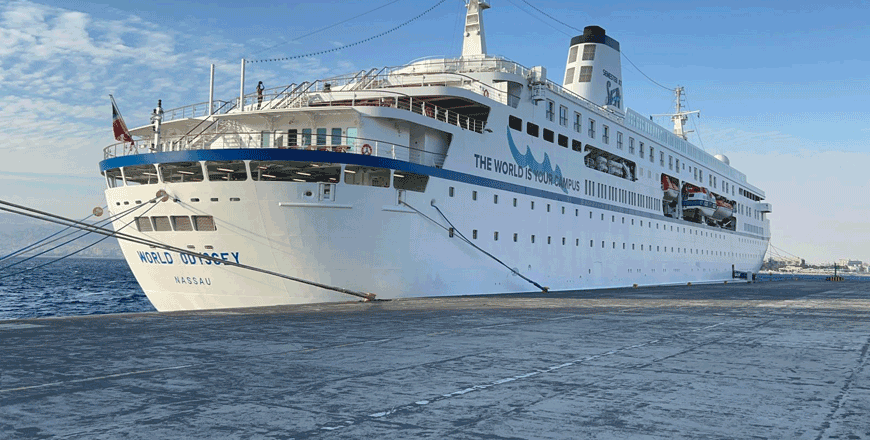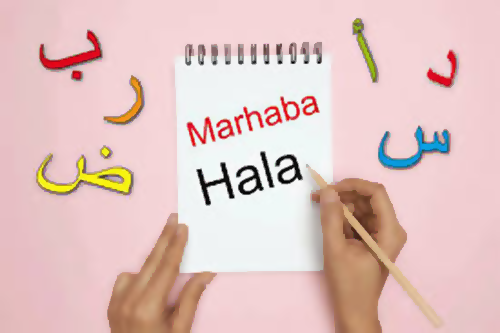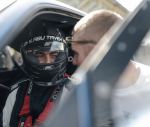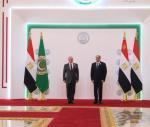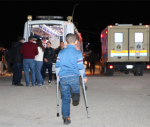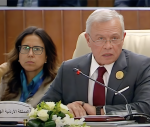You are here
Student brings Arabic coffee aroma to US campus after stay in Jordan
By Stephanie Genkin - Feb 01,2015 - Last updated at Feb 01,2015
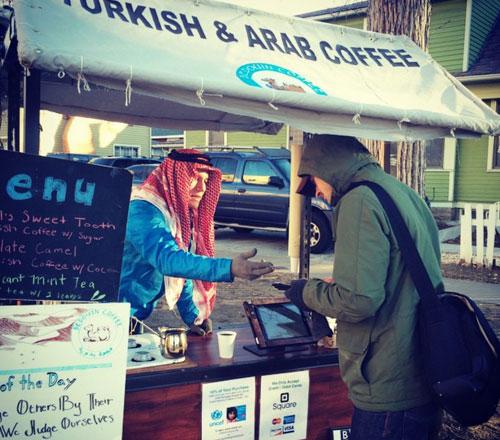
FORT COLLINS, Colorado — When Shane Evans arrived in Amman last summer for a cultural immersion programme run by the School for International Training, he wasn't a coffee drinker.
Today the senior at Colorado State University in Fort Collins, Colorado, is the owner of Bedouin Coffee, a small enterprise he founded several months ago and operates from a coffee cart around town.
There are many things that differentiate Bedouin Coffee from Starbucks or other coffee shops near campus. The most obvious is that it serves Arabic coffee.
"I love Arabic coffee," says Evans, who was first introduced to the Middle Eastern ritual of drinking tiny cups of thick black liquid over long conversations in Jordan. "I love the smell of the coffee."
He adds: "When you make Arabic coffee, the cardamom will separate and rise to the top and the coffee will sink to the bottom. So the first couple of sips really hit the uninitiated with a new flavour."
But it was more than the spice and the robust taste that sparked the idea for an Arabic coffee business after his summer study-abroad programme in Jordan.
The coffee was a symbol of a cultural experience and the deep connection to the region that the 20-year-old accounting major wanted to bring back to his hometown and share with others who had little knowledge of Jordan and the Arab world.
"It was a way for me to share the friendship and experiences I had gained in Jordan by serving coffee," says Evans, adding that there are a number of key aspects that make Bedouin Coffee unique.
"First, it's outdoors," he explains. "It's fun for people to park their bikes and have a coffee outside while talking to other customers."
Arabic music plays in the background.
"Fairouz is the music of choice," notes Evans, referring to the Lebanese singer revered throughout the Arab world. "It makes people from the Middle East feel at home."
Another way Evans and his servers, many of them students from Gulf countries like Kuwait and Saudi Arabia, share Arabic culture with their patrons is by writing their names in Arabic on the paper sleeve of the cup, like Starbucks, but with a twist.
"Sometimes we even wear a keffiyeh," says Evans, referring to the traditional Arab headdress, often associated with Arab nationalism.
"For people who have never had experience with Arab culture it's fun for them," he says.
He donates 10 per cent of his revenue to UNICEF-Syria, to support refugee children.
Evans' personal interest in Arab culture began when his parents, who live in Middleton, Colorado, decided to host a couple of students from Saudi Arabia, who were studying English in a local language school for foreign students.
A few days a week "we'd have a bunch of Saudi guys with their hookahs hanging out on our back porch or in our house cooking meals," recalls Evans fondly of the students and their fragrant water pipes (argilehs).
Around the same time he met a Kuwaiti student at school and started spending time with him and his friends playing volleyball and going to barbecues.
At first, Evans thought he would go to Morocco but Arab students on campus advised him to go to the Levant where the local dialect was more widely understood and closer to modern standard Arabic.
"The main reason I chose Jordan was the SIT programme which centred around home stay," says Evans. "I knew the home stay my family did for the Saudi students was really important to their time in Colorado and I wanted that same experience but in Jordan."
He lived with a family in Amman's Abdali neighbourhood.
SIT, also known as the School for International Training, is a programme of World Learning, a nonprofit organisation with programmes in 60 countries focused on education, exchange and development, according to SIT website.
The SIT summer programme in Jordan, which offers scholarships to qualified students from the US, offers intensive Arabic-language instruction that is deepened by cultural immersion.
In addition to home stays in both Amman and other parts of the country, students are fully immersed in Arabic-only environments by participating in volunteer and recreational activities with Jordanians.
Yasir Hamed, the programme's academic director in Jordan, says student involvement is essential.
The programme is based on "full language and cultural immersion teaching techniques that calls for 'Speak it to learn it'," he notes.
Evans embraced the programme and was "determined to fully benefit and use every single moment while in Jordan to increase his language proficiency," adds Hamed.
When asked what the biggest takeaway was from his experience in Jordan, Evans doesn't hesitate.
"Confidence," he says.
"Because of the programme I have the confidence to go back to the Middle East on my own,” says Evans, who hopes to return to the region in the fall on a scholarship to Birzeit University in the West Bank.
That new-found confidence has already kicked in.
"I've already been able to use some of the confidence I gained by starting the Arabic coffee company. I work with a hookah bar in town and sell coffee there," he says.
"Right now I'm working with a public library in Fort Collins to set up the coffee shop there. I don't know if I would've been able to approach them before even in my own language," Evans adds with a chuckle.
Once back in Colorado, Evans honed his skills making Arabic coffee by watching YouTube videos and practising a lot before opening Bedouin Coffee for business.
"It's really important to get it right," he says, even though he admits the conversation and the people are as important as the coffee.
"Some people still have stereotypes about Arabs post 9/11, and by having conversations and meeting Arab people I feel like it helps to break down stereotypes and people want to learn more."
Related Articles
More than 4,000 US soldiers based at Fort Carson, Colorado, are heading to Kuwait, where they will take over as one of America's largest ground forces in the region after President Barack Obama asked Congress to authorise military action against Daesh terror group.
AMMAN — Semester at Sea (SaS), a cruise-based study-abroad programme administered by the Institute of Shipboard Education (ISE) from Fort Co
AMMAN — Jordan has developed into a popular destination for international students, hosting over 46,000 international students, according to


